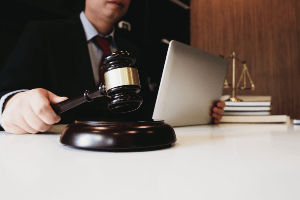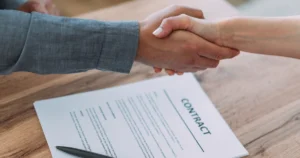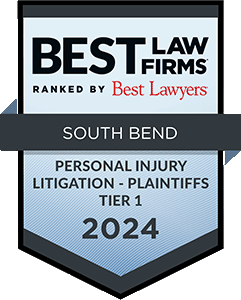 A summary judgment is a decision made by a judge based on the statements and evidence that are presented for the record. A summary judgment is made without the need for a proper trial.
A summary judgment is a decision made by a judge based on the statements and evidence that are presented for the record. A summary judgment is made without the need for a proper trial.
Below, we discuss who can request a summary judgment and how it may affect your right to pursue compensation for your damages.
If you were injured in an accident due to someone else’s negligent actions, call our South Bend personal injury attorneys today.
We do not charge you anything upfront. The initial consultation is also free, so there is no risk to you.
Who May Request a Summary Judgment?
Any party to a lawsuit may request a summary judgment. The judge must approve the motion, or request, for a summary judgment and then decide whether to grant it.
The liable party is usually the one to request a summary judgment in a personal injury case. This is usually because he or she believes there are enough undisputed facts to support his or her request.
In personal injury cases, the accident victim has the burden of proof. This means it is the accident victim’s responsibility to prove the negligent actions of another individual directly resulted in his or her damages.
When the liable party requests a summary judgment, the burden of proof shifts away from the injured victim to the liable party to disprove the accident victim’s claim.
Summary Judgment vs. Jury Trial
The summary judgment depends on whether an attorney can convince a judge that there is no case or that the case has merit and should be decided by a jury.
A judge is the only one who can determine whether to grant a summary judgment. Whereas a jury decides the outcome of a trial.
When a party requests a summary judgment, that party should have compelling evidence in his or her possession to disprove any claims the opposing party is making. For example, the liable party may have evidence of an unforeseen circumstance that would have prevented the at-fault party from acting in a reasonable manner to avoid an accident.
Take the case of an Indiana woman in March 2022. The woman requested a summary judgment after an accident she technically caused because she suffered an unforeseen medical emergency. A judge approved the summary judgment in her favor because she was able to prove her unforeseen medical emergency by presenting testimony from her own doctor.
If the woman did not have compelling evidence to convince the judge, then the lawsuit would have proceeded to the discovery phase to build a strong defense of her actions.
What Steps Are Involved in the Summary Judgment Process?
The process of a summary judgment begins with one party requesting it. That party must file the required paperwork and legal argument for why the judge should grant a summary judgment.
Once the motion for summary judgment is filed, the opposing party must be notified so a date for the hearing can be set. There must be enough time between the hearing and the date of notification for the opposing party to prepare a counterargument.
At the hearing, the party who requests the summary judgment must make a compelling argument, with evidence, for why the case should not proceed to a jury trial.
After each party states its case, the judge will review the information and make a decision. If the summary judgment is approved, then the case against the liable party is dismissed.
However, if the liable party fails to convince the judge to approve the summary judgment, that party may decide to settle the case to avoid losing in court.
If the summary judgment is denied, and the liable party still chooses not to settle the case, then each party must proceed with the legal proceedings of a jury trial. This means both parties must enter the discovery process.
How Can My Attorney Prevent a Summary Judgment?
If the liable party in your accident moves for a summary judgment, your attorney should take certain steps to prevent your case from being dismissed.
The most important first step is to review the reasons why the at-fault party is requesting the summary judgment. That way, your attorney may be able to determine what your counterargument should be.
Your attorney should also be prepared to present that counterargument at the hearing.
On your part, you should make sure you are getting the medical treatment you need and sticking to it. You should do all you can to protect your credibility as an accident victim. That also includes discussing your case only with your attorney and not posting about it on social media or discussing it with strangers.
Need Legal Help? Call Us Today
If you need legal help after an accident, call our knowledgeable attorneys today. Our lawyers have decades of experience dealing with insurance companies to recover compensation on behalf of injured individuals.
The consultation is free and there are no upfront fees.











